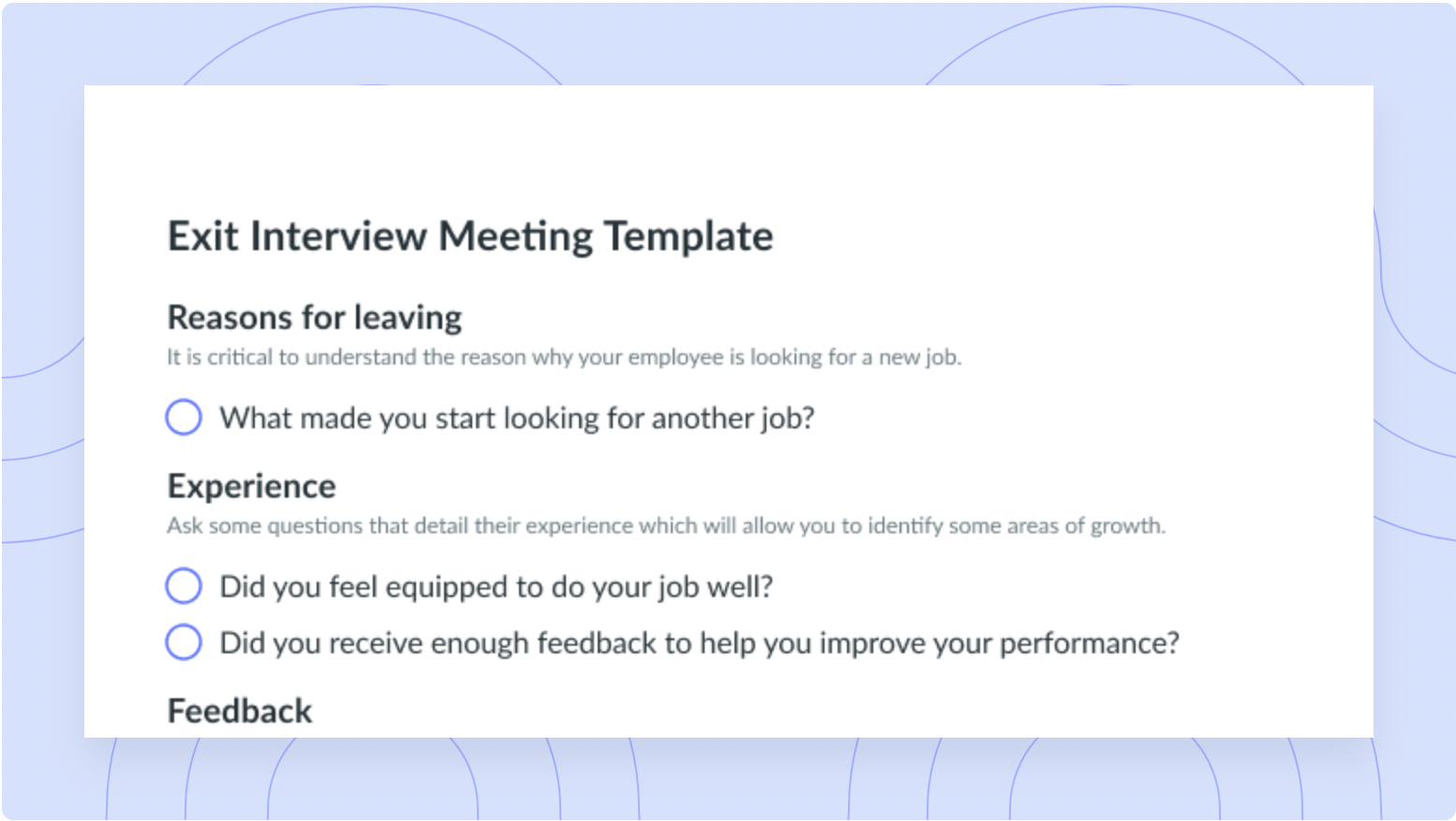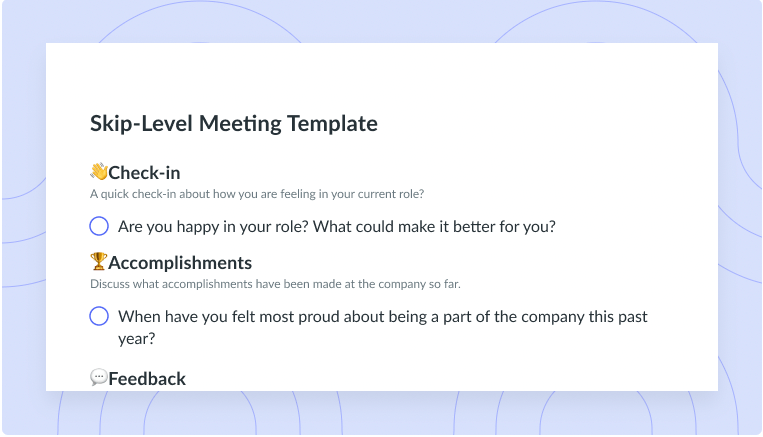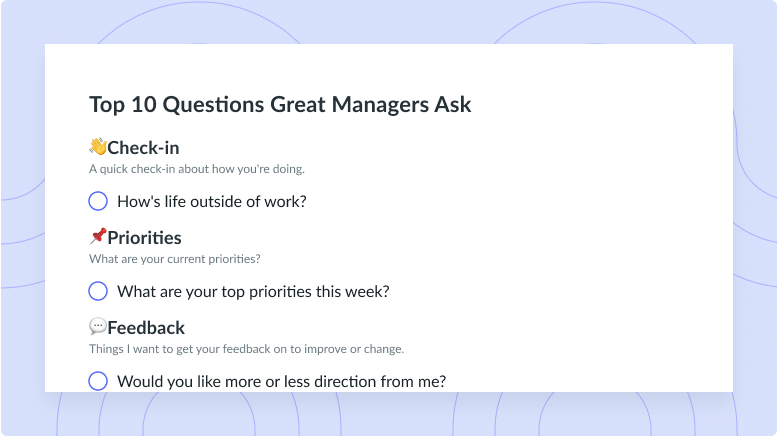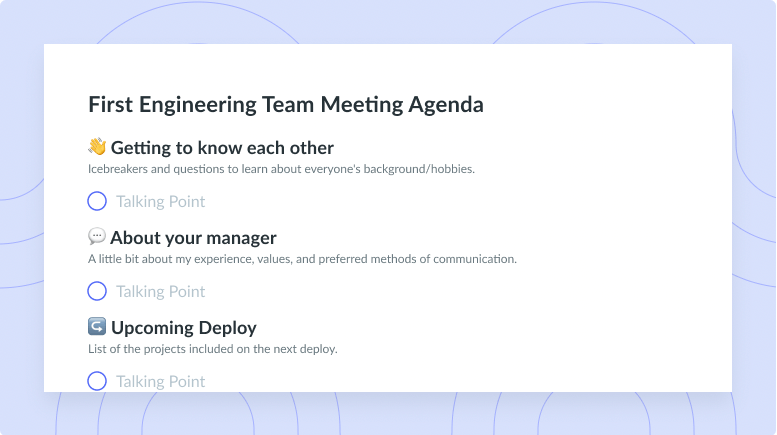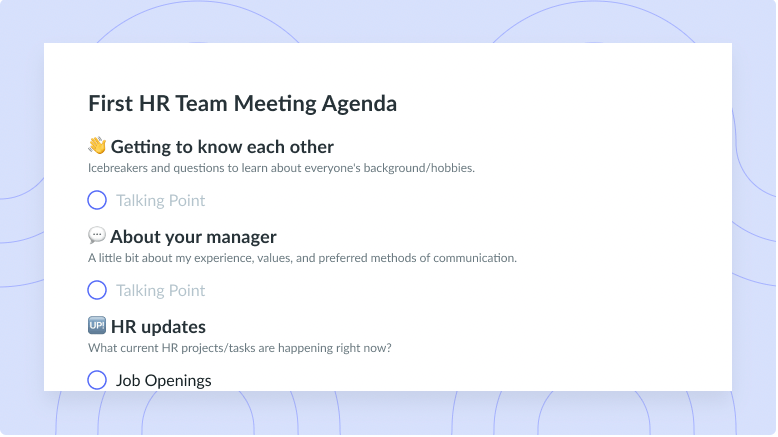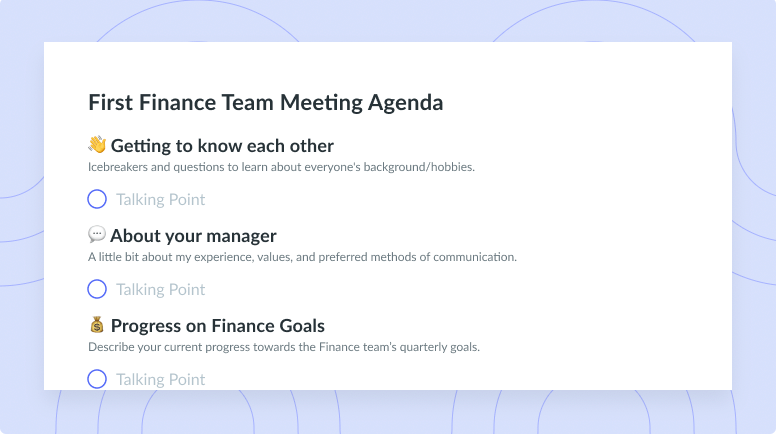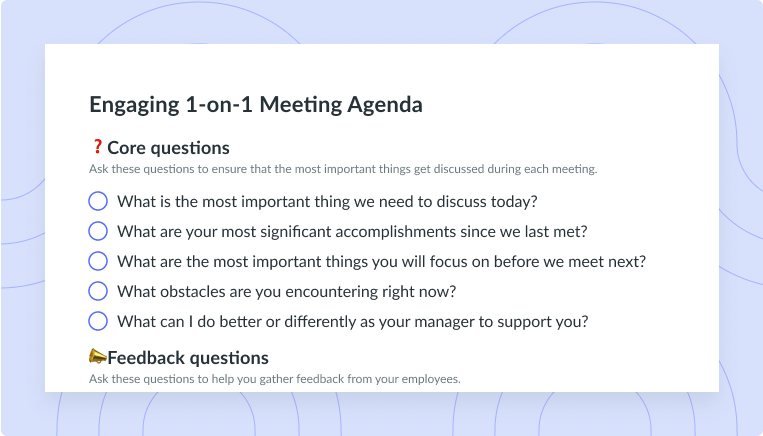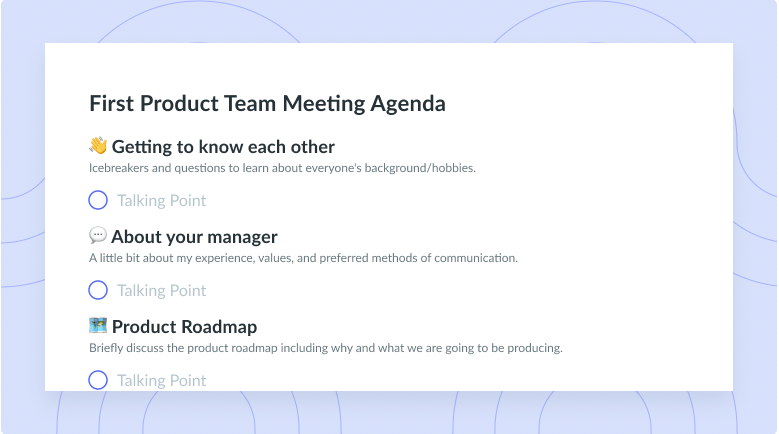16 Questions to Ask Your New Manager During Your Next Meeting
Get to know your boss and their management style by asking these essential questions.
Like any other change in the workplace, the transition to a new manager can be difficult. If you’re used to working with managers who are stellar communicators and already understand your workflow and feedback preferences, it may be challenging to warm up to someone new.
Getting to know your new boss’ management style and relaying your needs as an employee is a crucial step in achieving workplace satisfaction.
Let’s talk about questions you should ask your new manager during your next one-on-one meeting.
16 important questions to ask your new manager
- Can you recommend any self-study material?
- What is your preferred method of communication?
- What are your expectations for me as an employee?
- What performance goals should I be setting?
- What advice would you give me at this point in my career?
- Who are your biggest inspirations?
- What is your personal definition of success?
- What kind of skills and training should I seek out?
- What’s the best way I can offer feedback or ideas?
- What do you love most about your job?
- What made you hire me?
- What can I improve to take me to the next level?
- How will my performance be evaluated?
- What is your least favourite part of the job?
- Who should I meet with outside of our team or department?
- How do you prefer to communicate?
1 Can you recommend any self-study material?
Your manager likely has their role because they’ve acquired expertise through years of experience in your field. Don’t take their knowledge for granted! Ask your new manager what books, articles, news outlets, or other study materials they found beneficial in their pursuit of greatness. From the materials they suggest, you’re guaranteed to learn something that you can use to inspire your own habits. Even if their suggestions don’t resonate with you personally, they should give you insight into your boss’ interests and passions outside of work.

Never forget what was said
Have all your meeting notes documented in one place so you can always look back on what was said during meetings with a tool like Fellow!
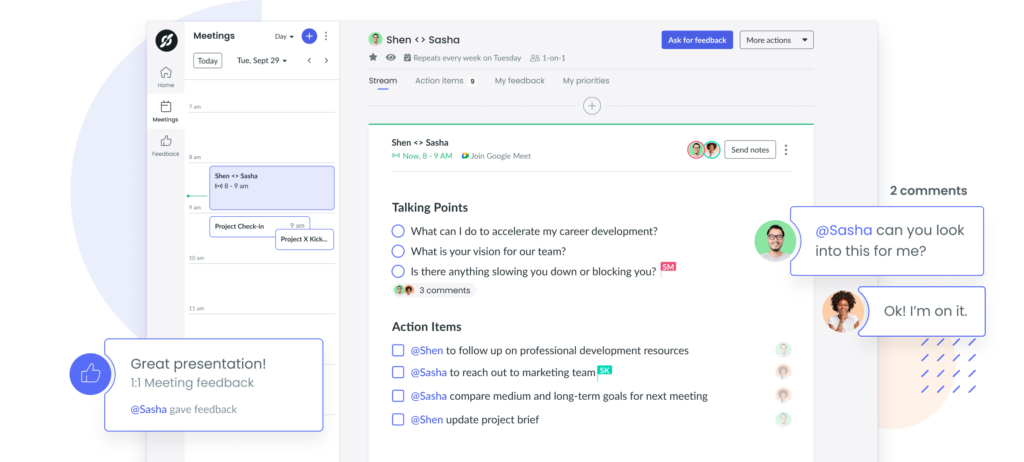
2 What is your preferred method of communication?
Understanding your manager’s preferred method of communication is key. Maybe they’re assertive and results-oriented, while you’re passive and process-oriented. Maybe they plan to be informal with their feedback, but you prefer a more formal feedback approach. Discussing how, when, and even where you like to communicate will be a game-changer for your working relationship and will prevent hiccups down the line.
3 What are your expectations for me as an employee?
Here’s where the conversation can get awkward. You may have different expectations for yourself as an employee than your manager does. But know that this is fine, so long as you discuss these expectations with them. Let’s say your new manager expects you to work at a pace you’re not used to on a project that requires unfamiliar software. In this scenario, it’s a good idea to ask for your manager’s expectations in terms of the timeline and end-result. You can then communicate how long you believe the task will take and how you’ll work to improve efficiency as you gain experience. Be proactive by chatting about expectations, admitting your learning curves, and establishing project checkpoints. Remember, the only thing more awkward than communicating expectations is dealing with the aftermath of unmet ones.
4 What performance goals should I be setting?
Check what objectives you should be setting to be of most value to your team and manager in the coming months. Track your progress on a regular basis, and adjust your habits as necessary to reach these set goals. Want to go the extra mile? Set yourself up for success by asking about promotion protocols if you’re interested in workplace advancement.
5 What advice would you give me at this point in my career?
Your manager was in your shoes at one point and may have even been in your current role. Therefore, they should be able to guide you in the actionable steps that will help you reach the next level of your career. For example, if your goal is to become a senior manager at your company within five years and this is the same level your own boss is currently at, ask what skills you can develop to get there.
6 Who are your biggest inspirations?
Learning who your manager looks up to can be an insightful, yet light-hearted question to ask during your next one-on-one meeting. Maybe they have a favourite self-help author whose words challenge them to create a better world, or maybe they’re inspired by a parent who has provided unwavering support. Most importantly, learn why they look up to this person. This insight will have you thinking deeply about your own mentors.
7 What is your personal definition of success?
Success is subjective. Learning how your manager defines it will help you better understand how their personal ideals compare to your own. It can also help you understand their leadership style. For example, they may define success by the company’s profitability, or by how happy their clients are with the services your team provides. Their definition of success can help you expand your own definition.
8 What kind of skills and training should I seek out?
You may be an excellent consultant, a talented engineer, or a detail-oriented journalist, but there will always be new tricks of the trade. If you have a growth mindset, you know that developing a new skill is possible with hard work and perseverance. Use this question as an opportunity to potentially uncover a personal weakness. For instance, if your manager recognizes that you struggle with public speaking as an introvert, they may encourage you to take a course to improve this skill.
9 What’s the best way I can offer feedback or ideas?
Every employee will have concerns about a work project or idea at some point in their career. For this reason, it’s best that you understand how your manager likes to receive feedback. Next time you have a suggestion that improves your manager’s idea or makes a task more efficient, you’ll know how to best approach the situation. Whether your boss has an open-door policy or prefers communication via email, learning the answer can help you two build a more functional relationship.
10 What do you love most about your job?
Asking this question should help you learn more about your manager’s motivations and personality. Each team in a workplace consists of individuals with various talents and passions working towards a common goal. Take the opportunity to learn what motivates your boss for clear insight into their vision for your team.
11 What made you hire me?
Your manager was likely impressed by many of your traits, skills, and experiences if they decided to bring you onto their team. Learning what aspects of your skillset are most beneficial to your manager’s vision can ensure expectations are met in the long term. It may seem like an embarrassing question to ask, but remember that this person has already recognized your strengths. Asking about your strengths will only help you understand how to best use them at work.
12 What can I improve to take me to the next level?
Asking for constructive feedback will help identify the areas that need some professional development before you attempt moving up in the workplace. Once you receive the feedback, it’s important to work towards improvement so you’re prepared when an opportunity for advancement arises. By the time you’re up for a promotion, you’ll be able to communicate how you took the feedback you received and implemented it.
13 How will my performance be evaluated?
Is your manager the bi-annual performance review type, or do they eliminate the review process entirely in favour of giving regular micro-feedback? Either way, learning your organization’s performance evaluation system will ensure that you’re prepared to discuss your growth and goals when the time comes. Asking this question can be the difference between feeling prepared or unprepared for your next performance evaluation. Skip the stress!
14 What is your least favourite part of the job?
It may seem strange, but asking about your manager’s least favourite part of the job can uncover some of their strengths and weaknesses. Maybe they enjoy managing hands-on projects with your team, but admit they still struggle with administrative tasks. If this is the case, you’ll understand in the future why they prioritize opportunities for collaborative tasks rather than respond to your emails as quickly as you had hoped. Remember that your manager is human too — they’ll have days ridden with frustration just like the rest of us.
15 Who should I meet with outside of our team or department?
Have you ever heard the saying “your network is your net worth”? Asking about knowledgeable individuals is like asking about study materials. Hopping on a call with someone your manager recommends will help you build an important workplace connection. Employees from other departments and teams will also expose you to unexplored areas of your organization.
16 How do you prefer to communicate?
Say it with me: open lines of communication. With today’s mix of in-person, virtual, and hybrid work settings, it’s important to be flexible about how you can communicate with your team.
Tips on how to approach the conversation
- Prepare the questions. Pick a few questions to start. Decide on ones that are most relevant to your role and save the rest for another time.
- Try the question on yourself first. Take a deep breath, look in the mirror, and practice asking your chosen questions confidently. Taking time to practice should alleviate some stress when the time comes to have your meeting.
- Be polite and efficient when asking for a meeting. Your meeting doesn’t have to be an hour or longer. Estimate how long it will take and choose an appropriate amount of time for your amount of questions.
- Send the questions in advance. Give your manager enough time to prepare thoughtful answers.
- Document the answers to your questions. Use Fellow to record meeting notes and action items in real-time for future reference.
Thrive at work by building a healthy relationship with your manager
We get it, there are a lot of important questions to ask your new manager, and you don’t want to take up too much of their time. Try not to get overwhelmed. Remember that your manager is there to help you thrive! They should have a wealth of knowledge regarding your role and should want to help you develop in your career. If you’re willing to get to know their management style by asking these questions, you’re already on your way to building a successful working relationship with them.









